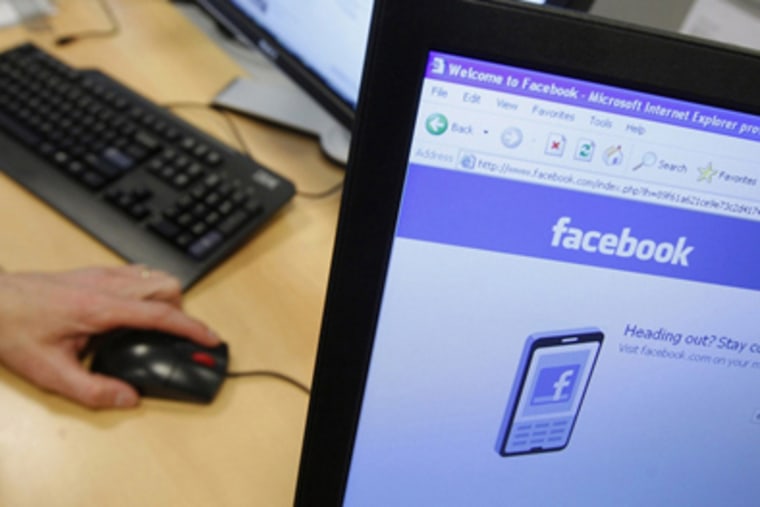Facebook is changing its policy on "humorous" posts and images that make light of rape and violence against women, following pressure from activists and advertisers.
In a statement published Tuesday, Facebook says it will process more complaints and will train its staff of reviewers using guidance from women's groups and legal experts. And should egregious material continue to slip through, women's advocacy groups will have direct contact with the social network.
"The guidelines used by these systems have failed to capture all the content that violates our standards," read the statement signed by Marne Levine, Facebook's vice president of Global Public Policy. "We need to do better — and we will."
Last week, the Women, Action & the Media group published an open letter explaining that Facebook wasn't doing enough to remove posts that condoned violence against women. With a quick search, anyone on the social network could see Photoshopped images of women along with slogans that encouraged or made light of rape and violent acts. For example, next to a woman whose face has been made to look like she was beaten, the text read, "1/3 of women are physically abused. 2/3 of men aren't doing their job."
Women, Action & the Media — joined by a coalition that included V-Day and the Everyday Sexism Project — called out not just the social network, but also advertisers whose ads have appeared beside offensive content.
The letter asked Facebook for a more nuanced moderation of posts, and more consistent execution of its existing policy. In addition to the letter, Women, Action & the Media has encouraged users to spot their own images, and post them on Twitter under the hashtag #fbrape.
Women, Action & the Media sung Facebook's praises following Tuesday's announcement, saying Facebook "has admirably done more than most other companies" to address their concerns about hate speech directed at women.
Unlike Reddit or Tumblr, social media sites which are reluctant to police comments and content, Facebook does ban hate speech, and has a system in place for users to report content that violates its Terms of Service agreement. But in its Community Standards, Facebook "distinguishes between serious and humorous speech." In the past, under this loophole, Facebook has been slow to tackle hateful content against not just women, but posts and pages that target ethnic minorities or religious groups or gays, as well.
It appears that when regular users report content that encourages or makes light of rape or violence, Facebook often leaves it up, WAM's executive director, Jaclyn Friedman told NBC News last week. "It's only when the media gets involved that the pages come down," she said.
A Facebook spokesperson previously told NBC News in an email, "We occasionally see people post distasteful or disturbing content, or make crude attempts at humor. While it may be vulgar and offensive, distasteful content on its own does not violate our policies." Also, "We do require that any such page be clearly marked — so users are aware that the content may be in poor taste."
Gender scholars suggest that trivializing violence and rape can aggravate a culture where abuse is a serious issue. There's also evidence that making light of violence and rape on media could have effects in the real world.
Readers of such content "are more likely to become numb to the pain and suffering of others," Ohio State University's Brad Bushman, author of a study of the effects of violent video games and media on real life empathy, told NBC News. "When positive things like humor or sex are linked with violence, the effects are particularly pernicious."
But it's not just the activist groups that pushed Facebook to reevaluate its policies. Since Facebook didn't block the content, Women, Action & the Media appealed to the advertisers who didn't want their ads associated with it.
One advertiser targeted in the campaign, Dove, told NBC News last week that the company was "working with Facebook to block our ads from appearing on these pages," adding that, "in the future, we will be refining our targeting to reduce the chance of any ads appearing on similar pages."
Another, airline Finnair, told NBC News, "We have been in contact with Facebook ... and urged them to take concrete action to ensure Finnair ads do not appear on hate speech sites," adding, "If Facebook is for some reason unable to solve this problem, we will need to reconsider our media strategy towards Facebook."
Other advertisers, including Zipcar and Audible, posted public responses to the campaign, and WAM says that 15 companies including Nissan UK asked to remove ads from Facebook.
"I'm so thrilled honestly that they've recognized that they have work to do," Friedman told NBC News Tuesday. "I feel like we're moving to a better place."
Nidhi Subbaraman writes about technology and science. Follow her on Facebook, Twitter and Google+.
